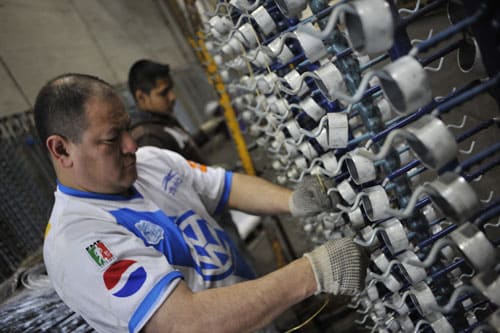
Aluminum Chromate Coating Services
Aluminum Chromating is a finishing process that passivates the surface of aluminum, converting it to a durable chromate layer through chemical reaction.
This type of finishing is also known as Chemical Films or Chromate Conversion Coatings and is commonly referred to by trade names Alodine® and Iridite®.
Key Benefits of Aluminum Chromating
- Corrosion Protection: The primary advantage of chemical films is their superior ability to protect aluminum surfaces from corrosion, extending the lifespan and reliability of components.
- Enhanced Adhesion: The chromate layer provides an excellent base for subsequent coatings such as paint and adhesives, ensuring durable finishes.
- Improved Aesthetics: Chromating enhances the visual appeal of aluminum with a uniform finish.
- Electrical Conductivity: Aluminum chromate has low electrical contact resistance, ideal for applications requiring efficient conductivity.
- Maintains Critical Dimensions: Unlike the plating processes, aluminum chromating does not add significant thickness to the surface, preserving critical dimensions of the part.
Understanding The Chromate Conversion Coating Process
Chromate Conversion involves immersing aluminum parts in chromate solution which activates a chemical reaction that creates a protective layer on the parts’ surface.
This layer greatly reduces corrosion and stops the typical oxidation seen in untreated aluminum. The outcome is longer-lasting components with improved resistance to environmental elements.
There are Three main phases to the Chem Film Process:
- Cleaning and Etching: First, the aluminum part is cleaned and etched to remove contaminants and prepare the surface.
- Chemical Conversion: Next it is immersed in a chromating solution, where a chemical reaction converts the surface to aluminum chromate.
- Rinsing and Drying: Lastly, the part is rinsed to remove any residual chemicals and then dried before packaging.
Gatto Platers also offers Zinc Plating and Zinc-Nickel Plating as other corrosion resistant finish alternatives. To learn more about our chromate conversion coatings contact us today!
Appearance and Types of Aluminum Chromate Coatings
Chemical Film Coatings generally offer a dull, uniform appearance, which can vary greatly based on the alloy type and surface condition before processing.
Additionally, these finishes are either trivalent or hexavalent. Trivalent chromate is RoHS compliant, and offers good corrosion resistance, while hexavalent chromate provides superior corrosion resistance and is often used in aerospace and military applications.
- Clear Chem Film/Chromate (RoHS Compliant)- Provides a colorless finish,offering a subtle protective layer.
- Yellow Chromate (Hexavalent)- Has a distinctive yellow color and is not RoHS compliant.
Key Specifications for Aluminum Chromating
The two most common specifications for chromate conversion coatings are:
- MIL-DTL-5541
- ASTM B 449
Frequently Asked Questions About Chemical Film Coatings
What is the Difference Between Aluminum Chromating and Plating?
Aluminum chromating chemically changes the surface of a part to reduce its susceptibility to corrosion, while plating adds a layer of metal onto the surface for protection. Chromating improves corrosion resistance and paint adhesion without changing dimensions, while plating alters dimensions by adding an additional layer of material.
Does Chromate Conversion Add Thickness?
Aluminum chromating creates an extremely thin layer that does not add significant thickness or affect the critical dimensions of a part.
What are Alodine® and Iridite®, and how do they differ?
Alodine® and Iridite® are branded chemical conversion coatings used to protect aluminum. Despite being from different manufacturers, both coatings meet the specification requirements for MIL-DTL-5541. Gatto’s chemical film process is also capable of meeting these specifications, providing an effective and reliable alternative.
Managing supplier reliability and lead time expectations can be challenging. Gatto simplifies this with our expertise in high-volume Chemical Film Coatings, accommodating parts up to 12 feet long. Our process surpasses industry standards such as MIL-DTL-5541 and ASTM B 449, providing you with dependable quality and timely deliveries to keep your production running smoothly.